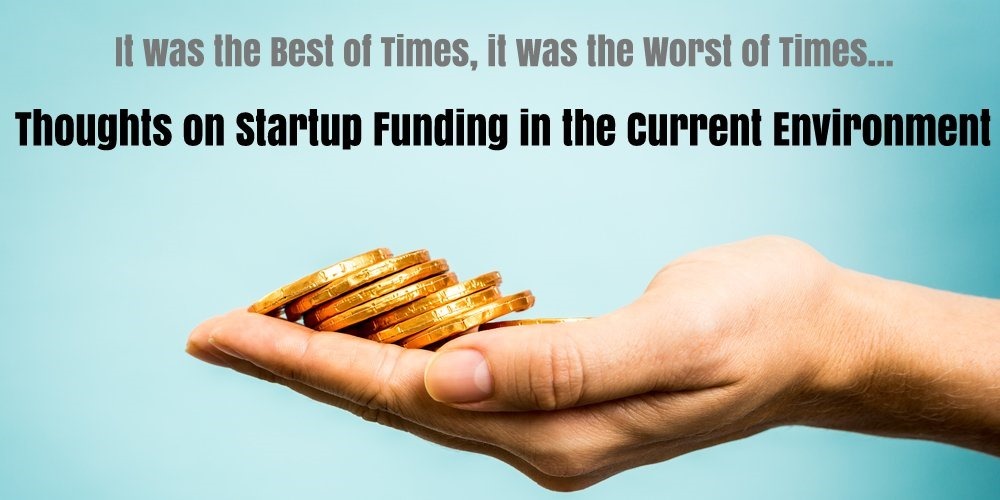It was the Best of Times, it was the Worst of Times… Thoughts on Startup Funding in the Current Environment

We live in interesting times. The Indian startup world is going through its next evolution, and it brings a whole new lexicon. Cockroaches, down-rounds, layoffs are trying to edge-out unicorns, runaways valuations and constant growth. And this is not a bad thing.
A lot of people leading or running startups haven’t seen a down-cycle. They were still in school in 2000–2001 and were either in college or in a job in 2008 and weren’t really affected. Interestingly, the current trough impacts the startup world more than the rest of the business world, which is just the market giving feedback to participants that it was over-heating.
Enough has been said about how we got here. This piece isn’t about that. This is a view on the way forward.
Going back to the title, it is indeed the best of times and worst of times concurrently. Which one it is for you, depends on the group you fall in.
Based on a series of discussions with founders, investors, participants in the startup ecosystem, this is the segmentation that’s forward looking:
Contents [hide]
Business Type
“ There are three types of startups: clones, mutants and new species.”
This was reportedly said by someone from Sequoia at EmTechAsia. The statement nails the idea very elegantly. No prizes for guessing which ones will have a way forward, and which won’t. The age of clones is passing, mutants rule the roost now. And we see new species emerging every day, creating new customers, new business models, and new revenue sources. More risky? Yes. But more exciting? More enticing for investors? Absolutely!
Age and Experience of Founders
Less than a year ago, I remember reading a front-page article in a business newspaper telling me that if you’re a founder over 30, the odds are against you for getting interest from investors. This is rapidly changing. Today, investors are focused on founders who know how to build a business, not just a great product.
Late last year, I met one of the founders of one of India’s most famous startups that has reached meteoric heights. I was discussing a business idea, and commented that there’s no barrier to entry to creating a site / app with the functionality we were discussing. He crystallized the point I’m trying to make here in one line:
There’s no barrier to entry in creating a website. There’s a massive barrier to entry in creating a business.
While there’ s a clear pull-back from investors, especially in Series B and beyond, there’s a lot of capital waiting on the sidelines, looking to be invested in solid founders. If you and your team has had accountability in your past for not just delivery, but P&L – the world’s still your oyster.
Frugality
In this environment, more than anything else, this is a hygiene factor. Startups used to be known for frugality, but the hey-days of 2000 and more recent years have spoilt founders with money. You want beer in your office, and are spending money on a table-tennis table and foosball?— something is wrong somewhere.
Don’t confuse perks with culture.?— Jack Dorsey
If frugality is part of your company’s DNA, it shows and is respected by investors and employees alike. If an employee leaves you because some other startup offers perks and you don’t?— it’s a win-win in my book.
I know a founder who received a sizeable seed round from a top-tier investor, which permitted him to move his team out from his garage to a proper office. He found a decent office space, costing X Rupees a month. His investor found another space, larger, nicer, better located, and pushed to the founder to take the larger space. However, this came at a cost of 4X Rupees a month.
The founder told the investor flat out?— if you want me to take the larger space, you pay for the difference. The investor reminded him that he had just written a check to the founder of which would literally cover the rent for over 1,000 months. The founder stuck to his guns, and was unwilling to burn his hard-fought seed-capital for rent when his current option was good enough.
End result, the company moved to the larger office, and the investor paid the rent difference for the first 12 months.
My already high respect for this founder increased manifold after this, and in my book he’s exactly the kind of founder who will succeed, independent of the environment.
Wrapping Up
Using an inevitable Game Of Thrones reference?— winter is here. Don’t end up like the Targaryens of old.
About the Author: Prashant Vijay has worked in Financial Services for over 13 years, and with startups for the last one year. He is an alumnus of the Indian School of Business, and Tulane University. At Flexing It™, he focuses on Business Development and odd jobs.
